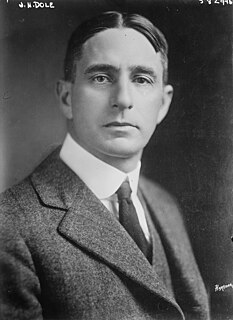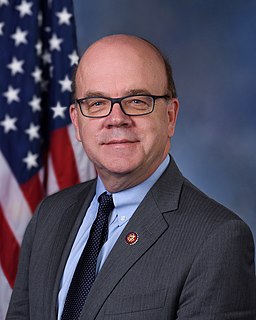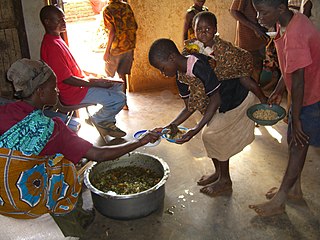Related Research Articles

The World Food Programme (WFP) is the food-assistance branch of the United Nations. It is the world's largest humanitarian organization, the largest one focused on hunger and food security, and the largest provider of school meals. Founded in 1961, it is headquartered in Rome and has offices in 80 countries. As of 2019, it served 97 million people in 88 countries, the largest since 2012, with two-thirds of its activities conducted in conflict zones.

Robert Joseph Dole is an American politician and attorney who represented Kansas in the United States Senate from 1969 to 1996. He was the Republican Leader of the United States Senate during the final 11 years of his tenure, including three nonconsecutive years as Senate Majority Leader. Prior to his 27 years in the Senate, he served in the United States House of Representatives from 1961 to 1969. Dole was also the Republican presidential nominee in the 1996 election and the vice presidential nominee in the 1976 election.

George Stanley McGovern was an American historian and South Dakota politician who was a U.S. representative and three-term U.S. senator, and the Democratic Party presidential nominee in the 1972 presidential election.

James Drummond Dole, also known as the "Pineapple King", was an American industrialist who developed the pineapple industry in Hawaii. He established the Hawaiian Pineapple Company (HAPCO) which was later reorganized to become the Dole Food Company and now operates in over 90 countries. Dole was a cousin of Sanford B. Dole, President of the Republic of Hawaii.

Alcorn State University is a public historically black land-grant university in Lorman, Mississippi. It was founded in 1871 and was the first Black land grant college established in the United States.

Food security is the measure of the availability of food and individuals' ability to access it. According to the United Nations’ Committee on World Food Security, food security is defined as meaning that all people, at all times, have physical, social, and economic access to sufficient, safe, and nutritious food that meets their food preferences and dietary needs for an active and healthy life. The availability of food irrespective of class, gender or region is another one. There is evidence of food security being a concern many thousands of years ago, with central authorities in ancient China and ancient Egypt being known to release food from storage in times of famine. At the 1974 World Food Conference, the term "food security" was defined with an emphasis on supply; food security is defined as the "availability at all times of adequate, nourishing, diverse, balanced and moderate world food supplies of basic foodstuffs to sustain a steady expansion of food consumption and to offset fluctuations in production and prices". Later definitions added demand and access issues to the definition. The first World Food Summit, held in 1996, stated that food security "exists when all people, at all times, have physical and economic access to sufficient, safe and nutritious food to meet their dietary needs and food preferences for an active and healthy life."

James Patrick McGovern is a member of the United States House of Representatives, representing Massachusetts's 2nd congressional district since 1997. He is the Chair of the House Rules Committee and of the Congressional-Executive Commission on China as well as the Co-Chair of the Tom Lantos Human Rights Commission. He is a member of the Democratic Party. The district, numbered as the 3rd district from 1997 to 2013, stretches from Worcester to the Pioneer Valley.

Dole plc is an Irish agricultural multinational corporation headquartered in Charlotte, North Carolina. The company is the largest producer of fruit and vegetables in the world, operating with 74,300 full-time and seasonal employees who are responsible for over 300 products in 90 countries. Dole markets such food items as bananas, pineapples, grapes, strawberries, salads, and other fresh and frozen fruits and juices. Dole owns a shipping line, "Dole Ocean Cargo Express".
Agribusiness refers to the enterprises, the industry, the system, and the field of study of the interrelated and interdependent value chains in agriculture and bio-economy. The primary goal of agribusiness is to maximize profit while sustainably satisfying the needs of consumers for products related to natural resources such as biotechnology, farms, food, forestry, fisheries, fuel, and fiber — usually with the exclusion of non-renewable resources such as mining.

Dakota Wesleyan University (DWU) is a private university in Mitchell, South Dakota. It was founded in 1885 and is affiliated with the United Methodist Church. The student body averages slightly fewer than 800 students. The campus of the university is listed on the National Register of Historic Places.
The Foreign Agricultural Service (FAS) is the foreign affairs agency with primary responsibility for the United States Department of Agriculture's (USDA) overseas programs — market development, international trade agreements and negotiations, and the collection of statistics and market information. It also administers the USDA's export credit guarantee and food aid programs and helps increase income and food availability in developing nations by mobilizing expertise for agriculturally led economic growth. The FAS mission statement reads, "Linking U.S. agriculture to the world to enhance export opportunities and global food security," and its motto is "Linking U.S. Agriculture to the World."

The Robert J. Dole Institute of Politics, often shortened to the Dole Institute, is a nonpartisan political institution located at the University of Kansas and founded by the former U.S. Senator from Kansas and 1996 Republican presidential candidate Bob Dole. Opened on July 22, 2003, Dole's 80th birthday, the institute's $11.3 million, 28,000-square-foot (2,600 m2) facility houses Dole's papers and hosts frequent political events. The institute is officially bi-partisan and has sponsored on-campus programs featuring prominent politicians of both major parties. The institute sponsors the Dole Lecture, which is given in April and features a prominent national figure addressing some aspect of contemporary politics or policy. The institute awards the annual Dole Leadership Prize each September, which includes a $25,000 cash award. The Presidential Lecture Series features the nation's leading presidential scholars, historians, journalists, and others including former Presidents, cabinet officers, and White House staff members who discuss the nation's highest office in ways that combine scholarly rigor with popular access. The archives hosted an exhibit in 2017 entitled "The League of Wives: Vietnam’s POW/MIA Allies & Advocates." In 2017, Elizabeth Dole gifted her career papers to the Dole Institute Archive and Special Collections.

Meds & Food for Kids is a nonprofit organization dedicated to treating and preventing child malnutrition in Haiti by producing fortified peanut-based foods. Meds & Food for Kids uses a peanut-based feeding approach called Ready-to-Use Therapeutic Food (RUTF), known as Medika Mamba.
In different administrative and organizational forms, the Food for Peace program of the United States has provided food assistance around the world for more than 50 years. Approximately 3 billion people in 150 countries have benefited directly from U.S. food assistance. The Office of Food for Peace within the United States Agency for International Development (USAID) is the U.S. Government's largest provider of overseas food assistance. The food assistance programming is funded primarily through the Food for Peace Act. The Office of Food for Peace also receives International Disaster Assistance Funds through the Foreign Assistance Act (FAA) that can be used in emergency settings.
The McGovern-Dole International Food for Education and Child Nutrition Program (IFEP) is a food aid program authorized in the Farm Security and Rural Investment Act of 2002 which provides for the donation of U.S. agricultural commodities and associated financial and technical assistance to carry out preschool and school feeding programs in foreign countries. Maternal, infant, and child nutrition programs also are authorized under this program. It is named after former U.S. Senators George McGovern and Bob Dole, who advocated in the U.S. Congress for its passage.
The United States Senate Select Committee on Nutrition and Human Needs was a select committee of the United States Senate between 1968 and 1977. It was sometimes referred to as the McGovern committee, after its only chairman, Senator George McGovern of South Dakota.

There were 795 million undernourished people in the world in 2014, a decrease of 216 million since 1990, despite the fact that the world already produces enough food to feed everyone—7 billion people—and could feed more than that—12 billion people.

School feeding programs have been defined by the World Bank as "targeted social safety nets that provide both educational and health benefits to the most vulnerable children, thereby increasing enrollment rates, reducing absenteeism, and improving food security at the household level". Beyond improvements in access to food, school feeding programs also have a positive impact on nutritional status, gender equity, and educational status, each of which contributes to improving overall levels of country and human development.
Steven Radelet is an American economist working within the field of International Development. He holds the Donald F. McHenry Chair in Global Human Development and is also the Director of the Global Human Development Program (GHDP) at Georgetown University, a program of the Edmund A. Walsh School of Foreign Service.
References
![]() This article incorporates public domain material from the Congressional Research Service document: Jasper Womach. "Report for Congress: Agriculture: A Glossary of Terms, Programs, and Laws, 2005 Edition" (PDF).
This article incorporates public domain material from the Congressional Research Service document: Jasper Womach. "Report for Congress: Agriculture: A Glossary of Terms, Programs, and Laws, 2005 Edition" (PDF).